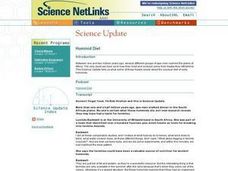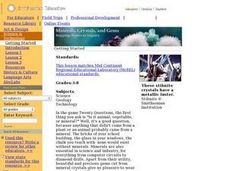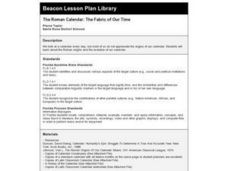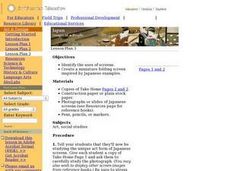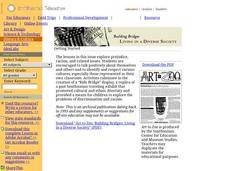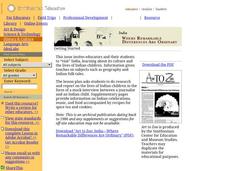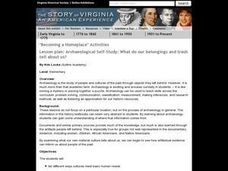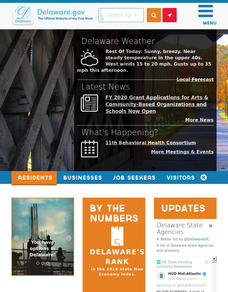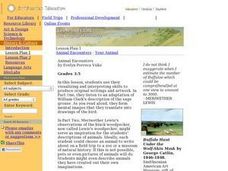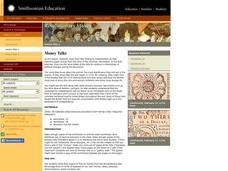Curated OER
Hominid Diet
Young scholars listen to an interview with Lucinda Backwell regarding fossil evidence that early hominids included termites in their diets. They participate in a discussion to investigate the significance of these findings.
Curated OER
Minerals, Crystals, and Gems
Students discover the relationships between minerals, crystals and gems. They bring in rocks that they find at home, in the schoolyard, etc. and examine them and attempt to identify them. They set up a classroom exhibit that includes all...
Curated OER
The Roman Calendar: The Fabric of Our Time
Fourth graders explore the Roman origins and evolution of our calendar.
Curated OER
Japan: Images of a People
Students learn the geography of Japan and its location in reference to the United States.
Curated OER
JAPAN, IMAGES A PEOPLE
Learners interpret Japanese and American paintings; evaluate paintings as sources of cultural and historical information
Curated OER
Lift and Drag: Principles of Flight and the Soaring Imagination
Students construct models of early gas balloons and gliders. In this balloon and glider lesson, students create models of early gas balloons and gliders, discover how the forces of lift and drag effect aircraft in flight, and put on...
Curated OER
Building Bridges: Living in a Diverse Society
Learners participate in various activities that help them build esteem, and explore racism. In this multicultural lesson plan, Students increase their awareness of, and appreciation for, cultural differences and similarities. This...
Curated OER
India: Where Remarkable Differences Are Ordinary
Students research India and Indian culture. In this Indian research lesson plan, students research and report on the lives of Indian children. The report will be in the form of a mock interview between a journalist and an Indian child....
Curated OER
Archaeological Self-Study: What Do Our Belongings and Trash Tell About Us?
Students examine how their belongings and their trash represents who they are. In this archaeology skills lesson, students watch a video titled "Discovering the Past" and then give archaeological techniques a try. Students examine and...
Curated OER
How Would the World be Different?
Learners examine the impact of Martin Luther King, Jr. In this civil rights lesson, students imagine the outcome of the Civil Rights Movement had King never been born. Learners compose essays that feature King's roles in the movement.
Curated OER
The Abolitionist Movement
Eleventh graders examine a petition presented by the Quakers to the Delaware General Assembly in 1785 and an anti-slavery broadside published in 1836.
Curated OER
Southern Agriculture and the Slave Trade
Students examine the relationship between agriculture and the slave trade during the 1860s. In groups, they research how two factors led to the explosion of slavery in the Southern United States. Using maps, they answer comprehension...
Curated OER
The Market for Moving People to America, 1610-1775
Students examine the markets that brought people to America. They identify the role of the immigrants in creating this country. They also analyze data to gather information about the time period.
Curated OER
Lewis and Clark: The Language of Discovery
Students replicate some of the trailblazing methods of Lewis and Clark on a fifteen-minute "writing journey" through the school or neighborhood.
Curated OER
Animal Encounters
Students use their visualizing and interpreting skills to produce original writings and artwork.
Curated OER
How Things Fly
Students observe photographs of selected twentieth-century aircraft at the National Air and Space Museum and note differences in the design of aircraft wings, fuselages, and engines.
Curated OER
How Things Fly
Students, by drawing on their own experiences, discuss and examine the basic physics of flight. They participate in a variety of activities regarding flight.
Curated OER
Stories of the Wrights' Flight
Students examine and compare primary and secondary source accounts of the Wright brothers' first flights on December 17, 1903.
Curated OER
Money Talks
Students move from fact finding to interpretation as they examine paper money from the time of the American Revolution. In the final exercise, they use the issue dates of the bills to construct a chronology of political changes during...
Curated OER
The Rocky Shore
Students compare a realistic landscape painting with a photograph of the same place.
Curated OER
From the Land, Of the Land: An Interdisciplinary Lesson on Indigenous People
Students research the concept of indigenous people then write a diamante poem about them. They research online and use an online poem tool to create their poem.
Curated OER
Aiken-Rhett House
Third graders visit the Rhett-Aiken House and discuss the people who lived there. They compare and contrast the lives of slaves who lived there. They practice using new vocabulary and examine the Gullah language and culture.
Curated OER
Spy on a Spider
Students view slides or live specimens to name and describe the distinguishing features of groups of arthropods, especially spiders and insects. They complete worksheets, observe webs and then search for and record where spiders can be...


